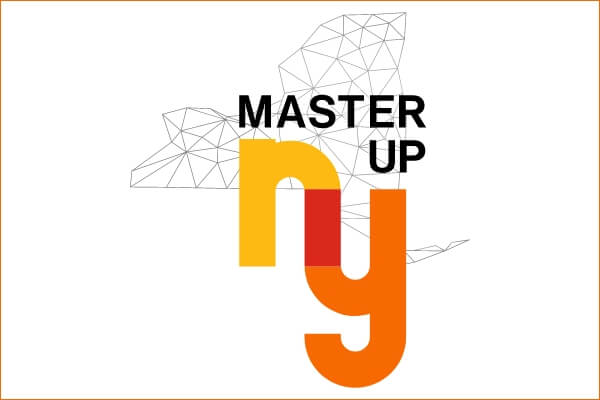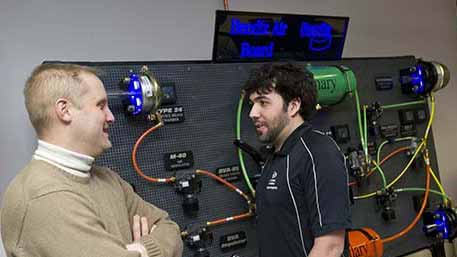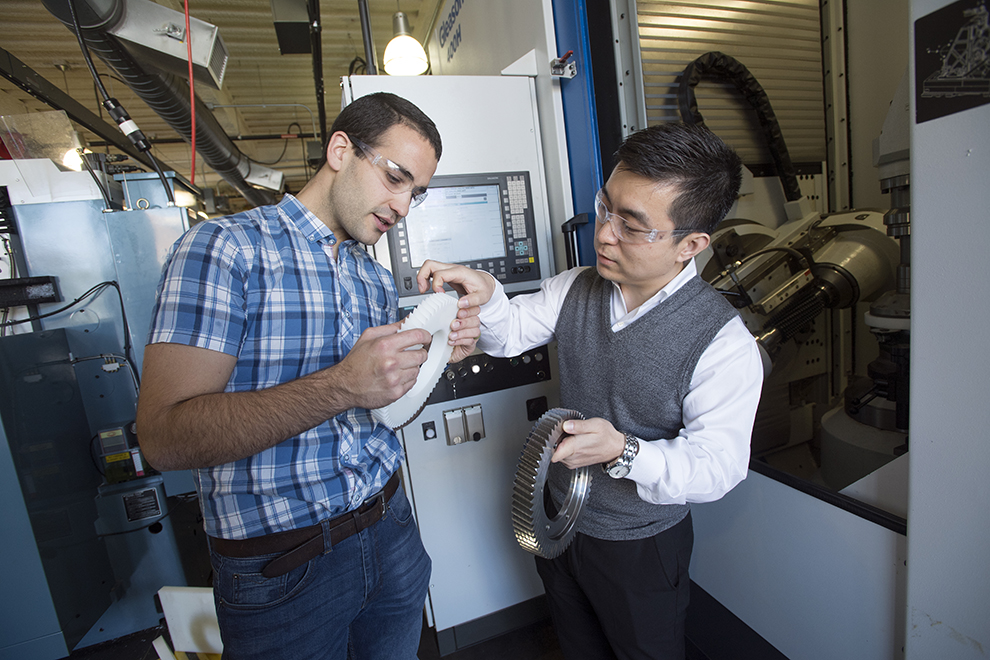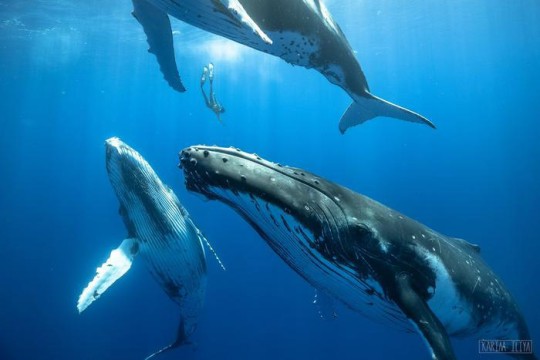Mechanical Engineering Master of Science Degree


Mechanical Engineering
Master of Science Degree
- RIT /
- Rochester Institute of Technology /
- Academics /
- Mechanical Engineering MS
Request Info about graduate study
Visit
Apply
Department of Mechanical Engineering
A mechanical engineering master’s degree that focuses on the in-depth examination of dynamics, robotics, nanotechnology, biomechanics, and energy systems to prepare you to enter a career in industry or research.
Overview for Mechanical Engineering MS
Why Study Mechanical Engineering at RIT?
- Dynamic Focus Areas: Choose from a wide range of focus areas, including robotics, nanotechnology, biomechanics, energy systems, and more.
- Career Readiness: Gain the skills necessary to secure a rewarding position in either research or industry.
- Optional Cooperative Education: Gain valuable employment experience in your field by participating in a co-op.
The mechanical engineering MS produces graduates who are leaders in their respective fields and ready to tackle high-level problems as practicing professionals. Designed for students who desire advanced training in specific areas of mechanical engineering, the master's in mechanical engineering acts as a prelude to a career in either research or industry. You can choose to focus on a variety of disciplines, including dynamics, robotics, nanotechnology, biomechanics, energy systems, or more.
RIT’s Mechanical Engineering Master’s Degree
The mechanical engineering MS prepares you to:
- Practice mechanical engineering in support of the design of engineered systems through the application of the fundamental knowledge, skills, and tools of mechanical engineering.
- Enhance your skills through formal education and training, independent inquiry, and professional development.
- Work independently as well as collaboratively with others while demonstrating the professional and ethical responsibilities of the engineering profession.
- Successfully pursue a graduate degree at the doctoral level, should you choose to do so.
Mechanical Engineering MS Courses
The master's in mechanical engineering includes core courses, focus area courses, elective courses, and a thesis. All full-time and full-time equivalent students are required to attend the weekly graduate seminar each semester they are on campus.
Focus Area Courses: You will develop a focus area of study in mechanical engineering related to your technical and professional development interests and goals. Examples of focus areas include automotive systems, business, controls, manufacturing, mechanics-design/materials, product development, sustainability, thermo/fluids engineering, and vibrations engineering.
Independent Study: You may earn a limited number of credit hours through independent study with guidance from a member of the graduate faculty. Areas for independent study include selected topics in applied mathematics, analytical mechanics, nonlinear mechanics, fracture mechanics, heat transfer, fluid mechanics, thermodynamics, control systems, optimal control, thermal stresses, composite materials, and biomechanics.
Thesis: Prior to completing course work in the mechanical engineering MS degree, you will prepare and present a formal thesis proposal to your faculty advisor. An acceptable proposal (which includes a statement of work, extensive literature search, and proposed timeline), signed by you and approved by your faculty advisor and department head, is required prior to registering for thesis credits. You will form a graduate thesis committee in coordination with your advisor and present your proposal to the committee for review and approval during the first semester in which you have registered for thesis credit. You are required to deliver a successful written and oral presentation of your thesis.
Students are also interested in: Manufacturing and Mechanical Systems Integration MS, Mechanical Engineering ME, Vibrations Adv. Cert.
Join us for Fall 2024
Many programs accept applications on a rolling, space-available basis.
30% Tuition Scholarship for NY Residents and Graduates
Now is the perfect time to earn your Master’s degree. If you’re a New York state resident with a bachelor’s degree or have/will graduate from a college or university in New York state, you are eligible to receive a 30% tuition scholarship.
Careers and Experiential Learning
Typical Job Titles
| Research and Development Engineer | Mechanical Engineer |
| Software Engineer | FEA Engineer |
| Packaging Engineer | Thermal Engineer |
Cooperative Education and Internships
What makes an RIT education exceptional? It’s the opportunity to complete relevant, hands-on engineering co-ops and internships with top companies in every single industry. At the graduate level, and paired with an advanced degree, cooperative education and internships give you the unparalleled credentials that truly set you apart. Learn more about graduate co-op and how it provides you with the career experience employers look for in their next top hires.
Cooperative education is strongly encouraged for graduate students in the mechanical engineering master's program.
Curriculum for 2023-2024 for Mechanical Engineering MS
Current Students: See Curriculum Requirements
Mechanical Engineering, MS degree, typical course sequence
| Course | Sem. Cr. Hrs. | |
|---|---|---|
| First Year | ||
| MECE-707 | Engineering Analysis This course trains students to utilize mathematical techniques from an engineering perspective, and provides essential background for success in graduate level studies. An intensive review of linear and nonlinear ordinary differential equations and Laplace transforms is provided. Laplace transform methods are extended to boundary-value problems and applications to control theory are discussed. Problem solving efficiency is stressed, and to this end, the utility of various available techniques are contrasted. The frequency response of ordinary differential equations is discussed extensively. Applications of linear algebra are examined, including the use of eigenvalue analysis in the solution of linear systems and in multivariate optimization. An introduction to Fourier analysis is also provided. (Prerequisites: (MATH-241 and MATH-326) or graduate student standing in the MECE-MS or MECE-ME programs.) Lecture 3 (Fall, Spring). |
3 |
| MECE-709 | Advanced Engineering Mathematics Advanced Engineering Mathematics provides the foundations for complex functions, vector calculus and advanced linear algebra and its applications in analyzing and solving a variety of mechanical engineering problems especially in the areas of mechanics, continuum mechanics, fluid dynamics, heat transfer, and vibrations. Topics include: vector algebra, vector calculus, functions of complex variables, ordinary differential equations and local stability, advanced matrix algebra, and partial differential equations. Mechanical engineering applications will be discussed throughout the course. (Prerequisites: MECE-707 or equivalent course or graduate student standing in MECE-MS or MECE-ME.) Lecture 3 (Fall, Spring). |
3 |
| MECE-795 | Graduate Seminar (fall, spring)* This seminar course presents topics of contemporary interest to graduate students enrolled in the program. Presentations include off campus speakers, and assistance with progressing on your research. Selected students and faculty may make presentations on current research under way in the department. All graduate students enrolled full time (whether dual degree or single degree) are required to attend a designated number of seminars. (This course is restricted to MECEMS-U or MECE-MS or MECE-ME or MECEME-U Major students.) Seminar 1 (Fall, Spring). |
0 |
Graduate Electives I, II, III, IV |
12 | |
| Second Year | ||
| MECE-790 | Thesis Thesis In conference with an adviser, a topic is chosen. Periodic progress reports and a final written document with an oral examination are required. (Enrollment in this course requires permission from the department offering the course.) Thesis (Fall, Spring, Summer). |
6 |
Graduate Elective V, VI |
6 | |
| Total Semester Credit Hours | 30 |
|
* Two semesters of Graduate Seminar (MECE-795) are required for all full-time and full-time equivalent students.
Admissions and Financial Aid
This program is available on-campus only.
| Offered | Admit Term(s) | Application Deadline | STEM Designated |
|---|---|---|---|
| Full‑time | Fall or Spring | Rolling | Yes |
| Part‑time | Fall or Spring | Rolling | No |
Full-time study is 9+ semester credit hours. Part-time study is 1‑8 semester credit hours. International students requiring a visa to study at the RIT Rochester campus must study full‑time.
Application Details
To be considered for admission to the Mechanical Engineering MS program, candidates must fulfill the following requirements:
- Complete an online graduate application.
- Submit copies of official transcript(s) (in English) of all previously completed undergraduate and graduate course work, including any transfer credit earned.
- Hold a baccalaureate degree (or US equivalent) from an accredited university or college in mechanical engineering, physics, or a related field.
- A recommended minimum cumulative GPA of 3.0 (or equivalent).
- Submit a current resume or curriculum vitae.
- Submit a personal statement of educational objectives.
- Submit two letters of recommendation.
- Entrance exam requirements: GRE required (waived for Spring 2024 and Fall 2024). No minimum score requirement.
- Writing samples are optional.
- Submit English language test scores (TOEFL, IELTS, PTE Academic), if required. Details are below.
English Language Test Scores
International applicants whose native language is not English must submit one of the following official English language test scores. Some international applicants may be considered for an English test requirement waiver.
| TOEFL | IELTS | PTE Academic |
|---|---|---|
| 79 | 6.5 | 56 |
International students below the minimum requirement may be considered for conditional admission. Each program requires balanced sub-scores when determining an applicant’s need for additional English language courses.
How to Apply Start or Manage Your Application
Cost and Financial Aid
An RIT graduate degree is an investment with lifelong returns. Graduate tuition varies by degree, the number of credits taken per semester, and delivery method. View the general cost of attendance or estimate the cost of your graduate degree.
A combination of sources can help fund your graduate degree. Learn how to fund your degree
Research
The faculty and students in the Kate Gleason College of Engineering are engaging in numerous areas of research, which takes place across all of our engineering disciplines and often involves other colleges at RIT, local health care institutions, and major industry partners. Explore the college's key research initiatives to learn more about our research in:
Latest News
-
March 6, 2024
![Tom Connelly speaks to students about maple sugaring as they gather around him in a circle]()
Maple Sugaring Society Photo Gallery
RIT students learn about tapping trees and gathering sap during the class Maple Syrup and our Environment. Instructors hope students connect with nature.
-
February 21, 2024
![Baleen Whales swim in the water with a scuba diver in the background]()
Baleen whales evolved a unique larynx to communicate but cannot escape human noise
Scienmag talks to Qian Xue and Xudong Zheng, associate professors, and Weili Jiang, postdoctoral research associate, all in the Department of Mechanical Engineering, about their research.
-
February 21, 2024
![students are shown at a project meeting in Engineering Hall]()
RIT undergraduate student team qualifies for First Nations High Power Rocket Launch
For the first time, RIT will be represented at the First Nations High Power Rocket Launch design competition. Six Native American scholars have committed to building a high-powered rocket for the challenge.





















